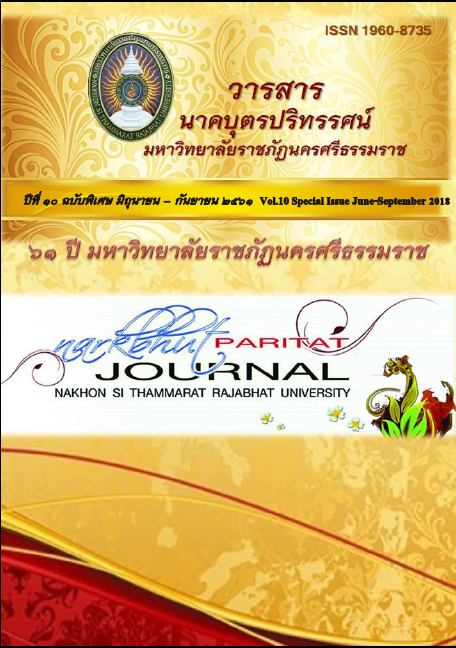การเรียนรู้ผ่านโครงงานบริการชุมชน Learning through community service projects
Main Article Content
บทคัดย่อ
การออกแบบการเรียนรู้ที่เหมาะสมกับผู้เรียนเป็นการช่วยส่งเสริมศักยภาพการเรียนรู้ของผู้เรียน การวิจัยเพื่อพัฒนาการเรียนรู้ของผู้เรียนในครั้งนี้มุ่งเน้นการออกแบบการเรียนการสอนที่ให้ผู้เรียนได้เรียนรู้ผ่านโครงงานบริการชุมชน คือให้ผู้เรียนได้ออกแบบการพัฒนาโครงงานเพื่อตอบโจทย์ความต้องการของชุมชนตามเนื้อหารายวิชาที่สามารถนำมาบูรณาการได้ โดยมีจุดประสงค์การวิจัยดังนี้ 1. ออกแบบการจัดการเรียนรู้โดยใช้โครงงานเป็นฐานบูรณาการกับการบริการชุมชน
2. ประเมินทักษะการเรียนรู้ที่เกิดขึ้นของผู้เรียน โดยมุ่งเน้นประเมินทักษะการเรียนรู้ 3 ด้าน คือ 1. ทักษะด้านการริเริ่มสร้างสรรค์และนวัตกรรม 2. ทักษะด้านการคิดอย่างมีวิจารณญาณและการแก้ปัญหา 3. ทักษะด้านการสื่อสารและความร่วมมือผลจากการวิจัยได้ผลดังนี้
1. ผลการประเมินทักษะด้านการริเริ่มสร้างสรรค์และนวัตกรรมปรากฏว่า การริเริ่มสร้างสรรค์จากสร้างสรรค์จากสิ่งเร้าที่กำหนดให้มีค่าคะแนนเฉลี่ยสูงที่สุดที่ค่าเฉลี่ย 4.47 และมีค่า S.D ที่ 0.07
2. ผลการประเมินทักษะการคิดอย่างมีวิจารณาญาณและการแก้ปัญหาปรากฏว่า ความสามารถในการกำหนดปัญหาและตั้งประเด็นคำถามเพื่อค้นหาคำตอบได้ค่าเฉลี่ยที่มีค่าสูงที่สุด 4.50 และ ค่ามี S.D. ที่ 0.07
3. ผลการประเมินทักษะด้านการสื่อสารและความร่วมมือปรากฏว่า โครงงานที่ได้รับมอบหมายในแต่ละกลุ่มสำเร็จตามช่วงเวลาที่กำหนดและมีค่าเฉลี่ยของการทำงานเป็นทีมในระดับ 4.73 และ มีค่า S.D ที่ 0.59
Article Details

อนุญาตภายใต้เงื่อนไข Creative Commons Attribution-NonCommercial-NoDerivatives 4.0 International License.
เอกสารอ้างอิง
Bureau of Vocational Education Standards and Qualification. (2014). Executive Summary: Operating Academic Project, the Academic Year of 2014. Bangkok: Vocational Education Commission.
Jariya Pichakum. (2017 January–June). Learning and Innovation Skills Developed by the Project-based Learning. Academic Journal: Uttaradit Rajabhat University.11(1). (in Thai)
Nilrat Navagitpaitoon. (2017 January–June). A Development learner competencies by research : “Classroom action research". Narkbhut paritat journal Nakhon Si Thammarat rajabhat university. 9(1). (in Thai)
OraKwo. (2012). Teachers’ Challenges in 21st Century : Pedagogy, Standardized Testing, and Paychecks. Retrieved 18 March 2016, from https://lripsm.wix.com.
Phukiet, L. (2009). Project Based Learning and Research Based Learning: Elementary Teachers Can do. Bangkok: SAHA & Sons Printing.
Pattrawat, K. (2013). Creativity: The important tool in 21st century. Prachachat. Retrieved March 10, 2016, from https://www. prachachat.net/ news_detail.php? newsid=1359702484.
Pattaraporn Plitakul. (2017). Learning Management based on Project-based Learning for Music Teaching Experiences of Current Students at the Faculty of Music. Silpakorn University. Veridian E-Journal, Silpakorn University.10(2). (in Thai)
Rujroad Kaewurai. (2013). The 8 Steps of a Project-Based Learning with Social Media to Enhance 21st Century Skills. Department of Educational Technology and Communications Faculty of Education, Naresuan University. (in Thai)
Steven W. (1994). Project-Based Learning: Pursuits with a Purpose. Educational Leadership. SDU Reserch Journal Humanities and Social Sciences. Retrieved March 10, 2016, from https://research.dusit.ac.th/.
Tisana Khammani. (2014). New century classroom. Bangkok: Sahamitr Printing & Publishing Co., Ltd. (in Thai)
Titiya N. (2012). The effect of Blended Collaborative Learning and Project Based Approaches on Knowledge Construction and Learning Achievement. Journal of Education and Training Studies 4(4).
Veerayut Chatakar. (2016). Action Research. Journal of Humanities and Social Sciences, SRU. 2(1) (in Thai)
Wichan Phanit. (2013). Teaching methods and student engagement techniques for the 21st century. Bangkok : ThaiSSF. (in Thai)


